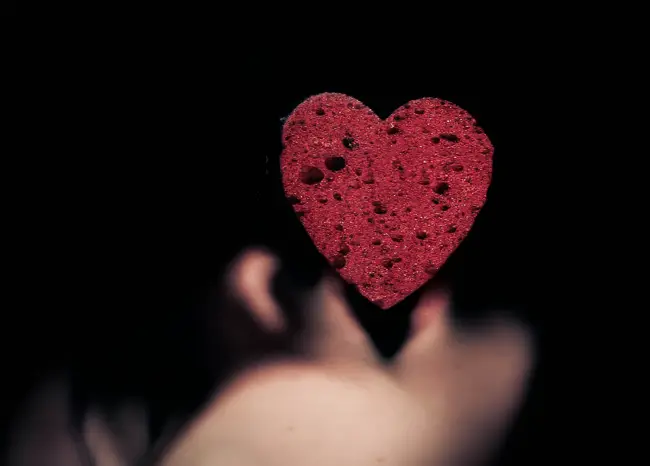
By Laurie Uttich
Alarge man in a black bear suit walks onscreen in a YouTube video. He stops in the middle of some guys tossing around two basketballs, makes some awkward 80s dance moves, and then moonwalks off the screen so well even Michael Jackson might have been impressed. More than 100 of my students watch the video in class. Not one of them see him.
I missed him, too.
You could blame technology and assume we were texting or tweeting or making cat memes on Tumblr. But in actuality we were all intently watching the one-minute video, an observation test produced by a company hoping to promote increased awareness of cyclists.
At the beginning of the video we’re instructed to count the number of passes one of the teams makes. We’re pretty successful with that—(spoiler alert: It’s 13)—but then, the announcer asks if we’ve noticed the “moonwalking bear.” We haven’t, but next time, we look for him and it’s painful how obvious he is. As the video states at the end, “It’s easy to miss something you’re not looking for.”
I think about this moonwalking bear when a student sends me an email with shouty caps and four exclamation points over a mistake I made on a grade. I think about the bear when a man flips me off while passing me, because I stopped in the middle of a suburban side street to avoid hitting a sandhill crane. And I try to think of him when one of my sons is distant with me or picks on his brother.
I’ve come to think of this moonwalking bear as the suffering in others that I can’t see. When you teach creative nonfiction, you learn quickly so many are carrying around pain. As Plato once wrote: “Be kind, for everyone you meet is fighting a hard battle.”
I wonder sometimes if the ways we now connect make it difficult for us to remember Plato’s point. For me, Facebook is the ultimate “moonwalking bear,” but instead of being unnoticed, it’s taking center stage and my own posts present a one-sided, breathtakingly positive image of my life.

But, of course, life is more complex than that. And while I believe that happiness is an active choice—and I fight for it every day—there were tough times this year. We lost a loved one and my son had a difficult surgery that took months of rehab. I posted briefly about both…and I worried each time about bleeding all over the screen.
I’m still trying to figure out what role I want social media to play in my life and I wonder if my 98 percent of positive posts also add to our collective perception that other people’s lives are “perfect”… and I’m concerned that this perception adds pain to those who are suffering. I worry, too, that perhaps the onslaught of “positivity posts” chips away at our urge to make real connections with others, to probe beneath the profiles we’ve created for ourselves and actively listen to those in pain.
I think about Aldous Huxley’s “Brave New World“ a great deal. I worry that this is the reality he warned us of: a culture where we are all so distracted by things we can enjoy—or buy—that we are missing what makes us human. And I worry that I’m often contributing to that culture.
Of course, there are plenty of us who do share painful stories on social media, and Facebook itself offers a constant stream of negative updates. While I may try to keep my own social media primarily “positive,” I first learned of the ISIS beheadings on Facebook and I’m hit almost daily with news of Ebola updates and refugees in Syria.
After a steady onslaught of social media, is it any wonder we sometimes feel numb to the suffering—or joy—of others?
Last June, the New York Times reported Facebook conducted a sketchy study in which researchers secretly manipulated the newsfeeds of 689,003 users by altering their number of positive and negative posts. The researchers found what you might expect: Those who received the continually positive posts (think: cat diaries and dogs reunited with veterans) wrote their own positive posts. Those stuck with a constant stream of negativity were more negative in their own posts.
We all know emotions can be contagious, but maybe we haven’t yet considered how impacted those emotions are by social media. And perhaps we aren’t yet concerned enough about how apathetic a steady diet of negative—or positive—news can make us over time. Maybe we forget that social media platforms are just that—platforms, our own personal mirages that feed our delusions about ourselves and others.
Because maybe, as the video with the moonwalking bear concludes, “It’s easy to miss something you’re not looking for.”
![]()
Laurie Uttich is an instructor of creative writing in the English Department of the University of Central Florida. Reach her by email here.






























Brad says
This is an interesting article that I think speaks to the heart of the issue with online social media . . . we mistakingly think of it as “something else”. We are still in the mindset that the online and offline are entirely separate. That it’s “just the internet”.
The truth is the the line between online and offline are gone. The internet has become the tool for the masses to connect. Social networks are meant to mimic and enhance offline connections. Unfortunately with so many adults still living in the world of AOL screen names, our young people are not getting the proper guidance and appropriate use of the online networks.
My advice to my kids and others has been pretty simple . . . online social networks are like normal public life. Whatever you post publicly should be no different than what you would say or do in public. Your profile is who you are and the presentation of yourself. Your privacy settings and who you connect with are about who you let into your house for a gathering. And keep in mind that things you say or do in that gathering made be shared to your guests connection if they want to pass it along just as it would if they actually gathered and socialized at your home.
I personally believe Educators and our schools could play a huge role in raising awareness and the charge for digital citizenship education. Our schools should be embracing the social networks and teaching appropriate use rather than simply policing them. They should be teaching on how to leverage these networks for communication and careers (LinkedIn as the new resume, your profile on all netwroks is your public persona). And they must acknowledge that young people are already going through identity crises in teen years striving to be visible. Online social networks simply make them even less visible so they attempt to use poor behavior they think is invisible to stand out. All the while they do not realize the repercussions and parents are not monitoring.
We don’t hand the keys to a car to a child until they’ve been educated and demonstrated responsible behavior. Stop handing the keys to technology over before you educate and the child demonstrates responsible behavior.
Sherry Epley says
Great Comment, Brad. . . right ON! Social Media should be taken very, very seriously. . . a quick turn “inside out” and it becomes the Orwellian “BIG BROTHER”. . . AKA the NSA! 1984 should be required reading for all high school students!